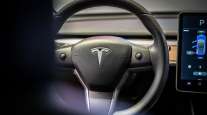Tesla to Open Hampton Roads’ First Service Center in Virginia Beach

[Stay on top of transportation news: Get TTNews in your inbox.]
Tesla owners in Hampton Roads, Va., who have had to go to Richmond or Raleigh, N.C., for in-person service that the company’s mobile-repair teams couldn’t handle, may get a shorter trip.
The Silicon Valley electric carmaker has signed a lease for a 9,580-square-foot space that was previously home to a Progressive Insurance service center. It would be just the third service center in all of Virginia besides those near Richmond and in Vienna.
A representative with Divaris Real Estate, which brokered the lease, confirmed the automaker plans to use the site for repairs.
What it won’t be is a dealership.

Musk
The company run by Elon Musk has been pulling back from opening new stores, even announcing earlier this year that it would shutter most and sell exclusively online before reversing course not long after. Bloomberg News quoted Musk telling analysts during a recent earnings call that service centers, not stores, are more important to car sales.
Tesla has two stores in the state near its existing service centers but not without controversy. Virginia bars car manufacturers from selling directly to consumers. That’s why the Virginia Automobile Dealers Association (VADA) was none too pleased when Tesla first came to the state.
Tesla won the ability to open its first Northern Virginia store only after a legal settlement when it appealed the state DMV commissioner’s adverse decision in 2013. It opened its Richmond store in 2017 after the DMV commissioner determined it could because there were no available, independent dealers who could sell the cars in the public interest despite several voicing a willingness to do so.
WANT MORE NEWS? Listen to today's Daily Briefing
Considering Tesla’s unique business model of selling the cars at a uniform price online and in stores, it would make it difficult for an independent dealer to make a profit if the automaker didn’t offer discounts or wholesale prices. If the dealer didn’t make a profit, it might shutter, leaving Tesla owners in a lurch, the commissioner concluded.
The dealers group sued, but in June, a Richmond Circuit Court judge sided with the automaker. VADA has appealed that decision to the state’s supreme court arguing, in part, that the commissioner’s decision was based on “nothing more than an assumption that Tesla, as opposed to dealers, could be profitable even though Tesla failed to submit any evidence supporting its own profitability.”
The company hasn’t made an annual profit since going public in 2010.
Don Hall, the president and CEO of the dealers association, says his fear is if Tesla goes out of business, there won’t be any independent dealerships or service stations.
“When they [Tesla] pull the plug, you’re going to have a lot of people who are injured,” he said. “That day will happen, and I will sit back and say I told you so.”




